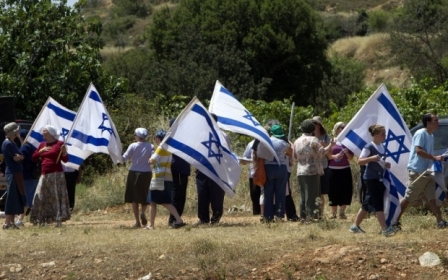Israel kills 2 Palestinians accused of kidnapping three settler teens

Israeli troops on Tuesday killed two Palestinians in the occupied West Bank, who Tel Aviv accuses of the killing of three Jewish teenage settlers in June.
Israel had cited the death of the settlers as a reason for launching its 51-day military offensive against the Gaza Strip.
The killings, during a raid on the suspects' hideout, came before Israeli and Palestinian delegations began negotiating in Cairo a more permanent Gaza ceasefire, almost jeopardising the talks, a Palestinian official said.
Amer Abu Eisha, 32, and Marwan Qawasmeh, 29, whom Israel accused of kidnapping and killing the settlers, were killed "in an exchange of fire" in the southern West Bank city of Hebron, the Israeli army said.
The pair were hiding out in a Hebron house and killed when gunfire erupted during an operation by the Shin Bet internal security services and the army's anti-terror unit.
Residents said they heard shots fired in what appeared to be a clash between the suspects and security forces, and that the army had also broken down the doors of several shops.
Dozens of Palestinian youths threw stones at the Israeli soldiers nearby, and following the shooting, a general strike was being staged across the city.
Sporadic clashes between stone-throwing youths and soldiers continued, but ceased briefly during the funerals of Abu Eisha and Qawasmeh.
Some 3,000 mourners attended the processions and burials in Hebron.
Hamas's armed wing the Ezzedine al-Qassam Brigades praised the two "martyred fighters".
Shin Bet said troops had also arrested at least three Palestinians alleged to have helped Abu Eisha and Qawasmeh to hide.
Prime Minister Benjamin Netanyahu praised the operation, saying the suspects had been "dealt with".
The West Bank-based Palestinian Authority's security chief Adnan al-Damiri accused Israel of "carrying out operations to kill (people) and destroy houses".
Palestinian security forces had known "nothing" about the whereabouts of the suspects, nor "how the Israeli army was able to enter this area," which is under full Palestinian control.
The June abduction of Naftali Frenkel, Gilad Shaer and Eyal Yifrach from a hitchhiking stop near Hebron sparked a vast Israeli search operation in which hundreds of Palestinians were arrested and at least five killed.
Israel immediately blamed the kidnappings on Hamas, rounding up hundreds of suspected members, without citing any evidence.
The brutal revenge killing by Jewish extremists of Mohammed Abu Khder, a Palestinian teenager in east Jerusalem, was followed by an uptick in rocket fire from Gaza, and the launch on July 8 of a full-scale Israeli military operation against the Strip.
More than 2,200 people died – mainly Palestinian civilians - during the offensive, which ended with an August 26 ceasefire.
Gaza truce negotiators set new talks for end October
Palestinian and Israeli negotiators met Tuesday in Cairo to discuss a more permanent truce, but a Palestinian official said the killings of Abu Eisha and Qawasmeh had almost scuppered the talks.
"The killing of the two youths in Hebron is causing a crisis, and could lead to the Palestinian delegation not attending indirect talks with the Israeli team," the official said ahead of the talks, requesting anonymity.
Rachel Frenkel, the mother of 16-year-old Naftali Frenkel, one of the three Jewish settlers, said she was relieved not to have to face his alleged killers in court, even though the accused have not yet been found guilty,
"I'm not all that sorry that I won't encounter their laughing faces in a courtroom," she told Israeli army radio.
The army had already partially destroyed the two suspects' homes on 1 July, a day after the settlers' bodies were found. The demolitions were completed in August.
Earlier this month, Israel charged the prime suspect in the settlers' killings, Qawasmeh, with organising and financing their kidnapping.
Israeli and Palestinian negotiators in Cairo on Tuesday agreed to schedule new talks on a durable Gaza ceasefire for the last week of October, a Hamas official said.
The delay in the talks had been expected, because of upcoming Jewish and Muslim holidays.
The Palestinian delegation, which includes rival factions Hamas and president Mahmud Abbas's Fatah, will remain in Cairo this week to discuss resolving their own disputes.
"We finished the indirect negotiations... it was agreed to resume them in the last week of October," senior Hamas negotiator Ezzat al-Rishq wrote on his Facebook page.
Egypt's foreign ministry said the next round of indirect talks would be held in the second half of October in Cairo.
During Tuesday's talks "both sides agreed to commit to the truce and have presented their suggestions for discussing pending issues," the ministry said in a statement.
The Israeli negotiators left Cairo after Tuesday's talks, an official at Cairo airport said.
Middle East Eye propose une couverture et une analyse indépendantes et incomparables du Moyen-Orient, de l’Afrique du Nord et d’autres régions du monde. Pour en savoir plus sur la reprise de ce contenu et les frais qui s’appliquent, veuillez remplir ce formulaire [en anglais]. Pour en savoir plus sur MEE, cliquez ici [en anglais].


